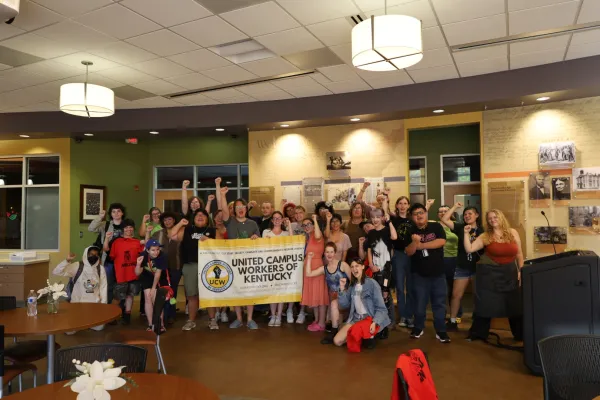When Staff Get Sick: The University of Kentucky has seen 103 cases of COVID-19 among employees. What accounts for those numbers?
This article originally appeared in Inside Higher Ed on September 30th, 2020.
The University of Kentucky has had more employees become infected with COVID-19 since mid-August than any other workplace in Lexington, the Lexington Herald-Leader has reported. At 103 infections from Aug. 13 to Sept. 14, the university has had more employees infected than the next nine employers -- including Amazon, Chik-Fil-A and grocery chain Kroger -- combined. That includes, but is certainly not limited to, faculty.
Workers at the university have said the administration is providing adequate personal protective equipment but not comprehensively carrying out other measures that the state has mandated for businesses.
Kentucky’s Healthy at Work minimums for businesses say workplaces must check temperatures of employees before work or instruct workers to take their own temperatures within 24 hours before reporting on the job. Some workers say neither of those things have happened.
“There’s no temperature checks,” said Donald Moore, a custodian with the university for 15 years. “They don’t tell us to take it at home.”
Matt Heil, circulation staff at the UK Law Library, made a similar assessment. “There’s no temperature check, and they’ve given us no guidelines about anything like that, either.”
“They just don’t mention it,” said Pierre Smith, a groundskeeper at the university.
Despite being the Lexington workplace with the highest number of cases among employees, the university has pushed back against using comparisons with other businesses to evaluate its infection rate.
“I don’t believe the comparison tells you much -- given our size and the amount of testing, tracing, screening and tracking we are doing compared to anyone else,” a spokesperson for the university said via email. “The University of Kentucky is the region’s largest employer -- by far, and so should be expected to have the largest number of positive cases. Without knowing the telecommuting, social distancing, mask, screening, tracing and testing policies at each of these businesses, it is not possible to make a fair comparison across these employers.”
In 2019, the university had 17,500 employees.
The university has also pointed out that it asks employees and students to screen themselves daily through an emailed questionnaire.
“We require everyone who comes on campus to screen. It is based on the [Centers for Disease Control and Prevention]’s algorithm for screening,” a spokesperson for the university said via email, in response to a question about temperature checks. “Further, every student who comes to campus or who lives on [campus] was provided a package that includes a thermometer, two masks, hand sanitizer and other health and safety tools.”
That screener is also part of Kentucky COVID-19 regulations for workplaces. The questions the UK screener asks are mostly in line with, but slightly different from, the ones the state says businesses must ask.
While the state has said every employee should be asked about each symptom of COVID-19 and respond to whether they’ve felt each one individually, the UK screener first asks employees if they are ill. If they answer yes, the survey provides a general follow-up question about symptoms. Other questions on the survey are also slightly different from the state guidelines.
Despite state regulations that say businesses and organizations should allow employees to telework to the greatest extent possible, some instructors at the university have said they have been pressured to teach in person even as case numbers have risen.
Michael McEwen, an M.F.A. student in creative writing, said he originally chose to teach in person, wanting to hold his class outside. But students in his environmental writing class showed some discomfort with that plan, McEwen said, and so after a class vote he decided to instead hold optionally in-person classes once every two weeks.
McEwen was told by a department chair that he needed to increase in-person class time to more than 50 percent of total class hours. Students had paid more for designated face-to-face classes. Otherwise, McEwen said he was told, he could tell students he was evaluating the situation for two weeks, but that the class would eventually be in person. He is now holding in-person classes once per week.
The university has said faculty have flexibility and choice of modality.
“Faculty have discretion regarding the modality in which they teach,” a university spokesperson said via email. “Faculty have been using that flexibility to make quick decisions, in fact, about changing modality when they need to as part of serving their needs and the needs of our students.”
The employee union -- United Campus Workers Kentucky -- has said it has reported the university for noncompliance with state regulations.
Rising Cases
According to local health department data, the University of Kentucky has seen over 2,000 cases among its students on campus. University students now account for 25 percent of Fayette County’s total COVID-19 cases.
On Wednesday, Fayette County was placed in the “red zone” for school reopening, meaning community spread is high enough that public schools must give fully remote instruction and cannot run extracurriculars or sports.
“Our understanding is that the increase in the incidence rate is directly linked to cases among University of Kentucky students,” Manny Caulk, superintendent of Fayette County Public Schools, wrote in a message to families Wednesday. “We have made contact with officials at the University of Kentucky to learn more about whether those cases are within an isolated UK cohort, or indicative of a wider community spread.”
But the university has defended its strategy.
“We have taken a data-driving, methodical approach to our response throughout this process. That hasn’t changed. We’ve followed the numbers and the science and we’ve always acted with our guiding principle in mind -- doing what is best for the health, safety and well-being of our campus community,” a university spokesperson said via email.
The fact that UK students account for 25 percent of total cases in the county is cumulative, he said, and does not represent the impact at this moment in time.
“Also, it is reliant on self-reported enrollment information and utilizes a wide variety of testing sources. Most importantly, positive cases are a function of testing and without normalizing across the various COVID-19 response, screening, tracing and testing policies, it is not possible to compare across entities and make a fair comparison as to whether this percentage is ‘good’ or ‘bad.’”
On Friday, the county health department announced it had 69 new COVID-19 cases for its daily tally. Thirty-one of those cases were college students.
The university has conducted more than 31,000 tests, including mandatory initial tests for students in dorms and Greek life, and has seen 1,300 positive results. The administration has recently launched wastewater testing and randomized student testing, and -- after insistence from the employee union -- is now offering free testing for faculty and staff.
“As demonstrated by our number of active cases, which has largely remained stable over the past several weeks, we believe we are effectively managing the spread of this disease,” the spokesperson said. According to a public dashboard, UK has more than 430 active cases. But seven-day averages for new cases, the university has said, are going down.
The employees’ union has pushed for more from the administration, including hazard pay, affordable health care for staff and a pledge to cover health-care costs associated with COVID-19 for on-campus workers.
Facilities workers, the union has said, are disproportionately Black and at high risk for COVID-19.
“If anybody’s got any chance of becoming infected, it’s us,” said Moore, the custodian, who is 57.
Smith, the groundskeeper, said he’s concerned about catching the virus. He is 54 and his girlfriend uses a breathing machine. He says students don’t always keep their masks on.
“I just kind of stay to myself and stay in a bubble,” he said. “I just don’t talk to anybody.”
Khari Gardner, a senior and the founder of the Movement for Black Lives campus organization, said his group has endorsed the union’s demands.
“It’s getting to an alarming point where UK has to make a decision about how they’re going to move forward,” Gardner said. “It’s starting to affect the community.”
“It’s time for UK to really take a chance and show that they care about the community,” he added. “We’re asking for the university to really take a stand and realize we’re not just numbers, percentages and dollar signs.”
Berea College agrees to 'sick leave' policy for student workers

